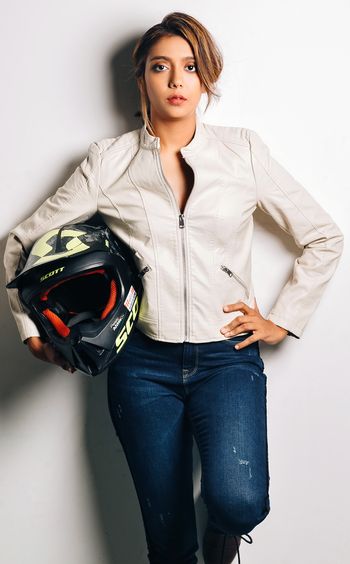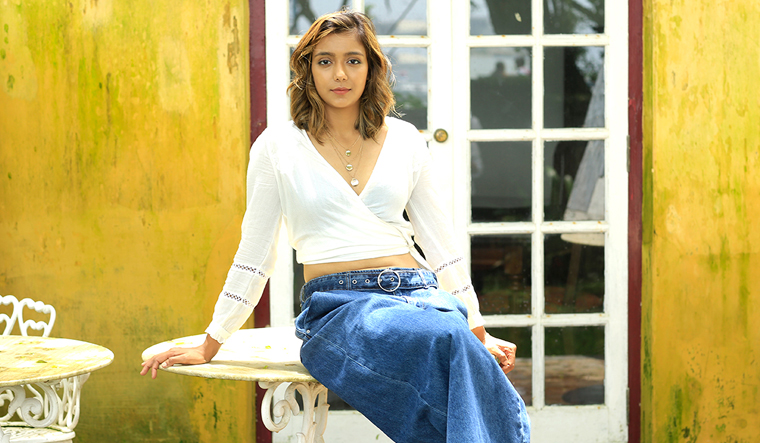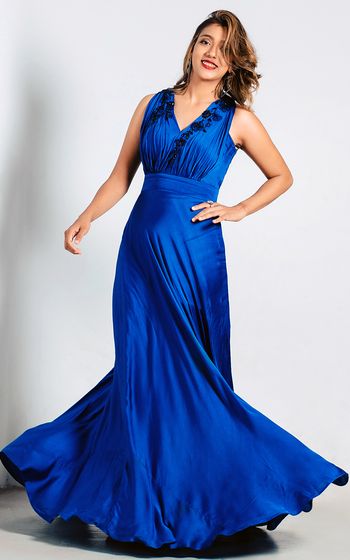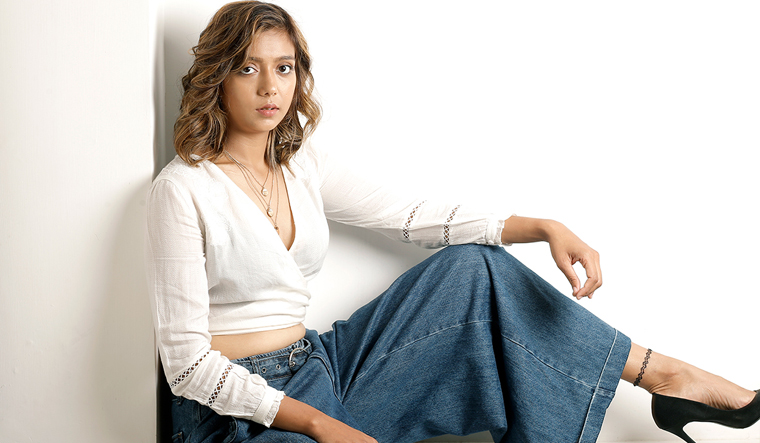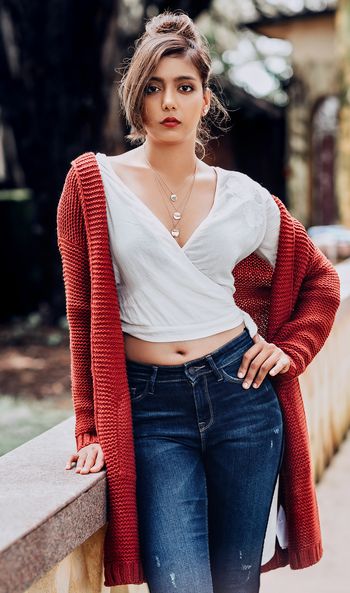Aishwarya Pissay's childhood memories come riding on two wheels. “My father used to take me on long rides on his bike,” recalls the Bengaluru-based Aishwarya, who was recently crowned the FIM Bajas world champion in Spain, the first Indian to win an international event in motorsports. Perched on the petrol tank, the little girl would feel the air in her hair. The memory grinds to a halt, as she turns realistic. “I never thought of making it big in the world of motorsports,” the 24-year-old tells Smart Life.
Dressed in a pair of baby pink pants and white shirt, Aishwarya is calm and composed as she takes in the greenery that is synonymous with Kerala on the way from the Cochin International Airport to the city centre. The 5’9” racer stays silent for a while—probably absorbing the energy of the new place—and then starts humming along with the Shawn Mendes song playing on the car audio system. And, the comparison kicks in. “Everything is so fast in my city. It’s so laid back over here,” she says, before picking up her phone, which had started chirping. She speaks in fluent Kannada, and it sounds like directions to the place where she stays. After a couple more calls, she lets out a sigh of relief. “I ordered a study table online and it is getting delivered today. It was about time I bought one,” she says. “I stress on value for money; I don’t buy unwanted things. This table was something that my younger brother and I needed, and plus, it has storage space for books.”
She shows me a picture of the table on her phone. The screen is cracked. “It’s good the screen is cracked,” she reasons. “It stops me from looking at my phone too much. I think I have more time in hand now.” Her brother, who has recently moved in with her, is in high school. “He is a very sweet person but sometimes, living with him can be hard. I am used to my space and living alone. Unlike me, he is not really into motorsports; nobody in my family is,” she says.
Although Aishwarya was born and brought up in Bengaluru, her roots are in Maharashtra―she speaks fluent Marathi too. “My great-grandparents moved to Bengaluru a long time ago. So, at home we speak Marathi. But I am a proper Bengaluru girl,” she says.
Aishwarya’s parents got separated when she was nine. “In a way, I did not have the pressure of parental expectations because my father and mother are not together. So, when I took the decision to be a racer, my parents didn’t really have a say in it. My mother did show some concern, but not enough to interfere with my plans,” she says.
According to Aishwarya, the major challenge was to convince her extended family. “I come from a conservative family, where it is considered a taboo to do anything apart from a 9-to-5 job. My parents have it, my grandparents had it and they wanted me to do the same. I was determined that I will pursue my passion of riding and went ahead with my plan. The journey was rough, but definitely worth it. I have not regretted that decision even once,” she says, looking at the raindrops on the window.
When Aishwarya got into the racing scene, there were only a handful of women racers in the country. It was deemed a man’s world. “Forget racing, the people in our country feel motorcycles aren’t for women. When I started riding at the age of 18, people would give me death glares. The engine would go off and I could see men frowning at me,” she says. According to her, things are much better now. “Yes, it is a dangerous sport but, it is equally dangerous for both men and women. No parent would want their child to get into this sport―not even take it up as a hobby, forget about making it a career,” she says.
As she tucks into the chicken biryani and traditional beef fry with coconut pieces, Aishwarya is almost on the verge of tears! “I love spicy food! But, now, I can’t take in a lot of spice as I have been eating bland food in Spain,” she says. “It will take some time for my palate to come back to normal.” By the way she eats, one could tell that the girl loves her food. “I get cranky if I don’t eat my meals on time; I can’t talk or do anything for that matter when I skip meals. I have to keep eating or drinking something at regular intervals,” she says. And, her elaborate diet chart is proof enough.
After taking a couple of sips from her juice bottle, she talks about the importance of staying hydrated. “It is so important to keep taking in fluids. The reason we complain about cramps is because we don’t drink enough water,” she says. For a racer, she definitely knows her body and its wellness. According to Aishwarya, when it came to training, her coaches always treated her as a racer and not a girl. “Training is the same for both men and women. I do strength and mental conditioning at the gym at least three days a week. The rest of the days I train on my bike at the Bigrock Dirt Park to work on my skills. I keep riding until I get all my loops and turns right,” she says. According to her, when you don’t do fitness training, the body tends to experience fatigue. “The fatigue inside is just waiting for you stop training, so that it can come out,” she says.
Starting point
Aishwarya had her moment of clarity when she repeated a school year, which gave her time to think and figure out life. “I did not do well in Class XII and my father kicked me out of the house. I went to stay with my mother. It gave me time to do some part-time work and study; I also started riding the bike during this time. Soon, I started taking weekend bike trips with friends,” she says. The year off ignited a love for riding and she covered 8,000km from Rann of Kutch in Gujarat to Cherrapunji in Meghalaya in 24 days for a show on MTV. She also started taking up time-based challenges like saddle-sore and bun burner. This was the time her friend suggested she take up racing, and she leapt at the idea.
“My father had said that I won’t become anything in life. I wanted to prove him wrong. I have failed before but that made my success sweeter. Contrary to what my father said, I have a name now and I will never take this success for granted. Anyone can be anything at any time―the secret is to work hard and be consistent when it comes to pursuing your passion,” she says. Well, for a fact, she definitely reads a lot of self-help books―she was holding onto Prakash Iyer's ‘The Habit of Winning’ during her trip to Kochi.
In 2015, she started training for racing at Apex Racing Academy, in Coimbatore, and that is when professional racing came into the picture. It was her lucky year because TVS Racing spotted her in one of the races and that got her into their factory racing team. “TVS Racing gave me technical and financial support to pursue my dream of being a racer. Although I never thought my passion would turn into a career, it did and it is something that I will never give up on,” she says.
Aishwarya debuted at the TVS One-Make Race championship for women in 2016 and became the champion of the series. In the following year, she won the Raid De Himalaya, the six-day off-road rally Dakshin Dare―a career milestone―Indian National Rally Championship and TVS Apache Ladies One-Make Championship.
Apart from racing, Aishwarya also conducts workshops for other racers. “It’s exciting to see many women come on board. Motorsport is getting more serious. Before, it was more of a weekend road trip sort of idea, but now with many riding clubs, it is gaining momentum,” she says.
Aishwarya won four national titles in road racing and rally championships in 2016 and 2017 and won the National Rally Championship in 2018 as well. After her outstanding performance in Portugal and at the Dubai Baja early this year, Aishwarya created history in Baja Aragon, which took place in the last week of July in Spain. Her main objective was to endure and finish the four rallies of the Bajas championship to win the five-rider women’s field since the other riders did not compete in all the rounds. She won the first round of the championship in Dubai; she was the only woman in the field. The luxury of the points that she gathered in the first round helped in the subsequent rounds in which she finished behind other riders. Since no other woman from the country ventured into international motorsports before, the global title’s value shot up as Aishwarya became the first Indian to bag it.
Having said that, surviving the Bajas―over tough terrains, dust and dirt in events spanning two days―is no cake walk. It is true that her competitors didn’t have the backing to compete in all the rounds but it isn’t Aishwarya’s fault that they didn’t. Her patience in boardrooms, the struggle to get sponsor support―TVS supports her in the national circuit and she has other backers for her international races―sure did help. Getting sponsors is critical when it comes to racing, because, as they say, many titles are won and lost in this battle. Although it sounds unfair, it definitely builds the business skills of sportspersons, which are necessary to attract sponsors. So there is a reason why racers go for mental conditioning on a regular basis!
“When I started racing, the male racers in the factory asked me why I chose this sport. They said statements like, ‘You rather stay at home lest you want to break a bone or two!’ I couldn’t say anything at that point but I did make sure that my performances spoke for me,” she says.
In the initial days of racing, Aishwarya competed with men as well. “I took part in the Formula Junior Racing series in 2016. I finished fifth with the boys in my category; there were nine of them. They gave me a trophy of appreciation with no label, but it was very encouraging. It really boosted my confidence,” she says.
When asked if she gets nervous before a race, she says, “I like to be left alone before a race; I don’t really like talking to anyone at that point.” According to her, it is necessary to calm the nerves and be composed. “I go through the map or I have a book to distract me. I play music and all I do is visualise. I sit down, close my eyes and tell myself that if I can ride 30 laps in my head without opening my eyes―if I can get it right every single time, then I am assured that everything is going to be fine. Even during my fitness sessions, I am riding in my head. And then, when my trainer says it’s done, I feel like I crossed the checkered flag at the finishing point,” she says.
Shoot day
When it comes to punctuality, Aishwarya is spot on. She was up and ready before time. As she walks out the hotel lobby, she says, “By 10pm, I am asleep. I get solid eight hours of sleep and wake up early in the morning. I think it’s a discipline everybody should follow.”
Throughout the journey to the shoot site, she kept pointing at movie hoardings along the way; she was keen to know about Malayalam movies. But when asked if she wants to get into films in the future, a flat no was the answer. “I am not a big fan of movies. Yes, I watch them once in a while but I don’t really idolise an actor and keep watching movies that I have already watched,” she says.
She may not be interested in acting, but the young racer is not camera shy. She has done a couple of videos with TVS racing factory and also for the energy drink Mountain Dew. Even during the Smart Life cover shoot, she was a natural.
As the makeup artist contours the foundation on her face, he points at a scar on her collar bone. “It broke into three pieces in a bike crash in 2017,” she says without batting an eyebrow. Aishwarya calls it a rough phase, but she got back stronger and her comeback made the country proud. “I thought that might be the end of my career as a racer. I had a plate and seven screws on my collar bone. I had a race that same weekend. I had no idea how I was going to do it with my right hand having no strength. But five days after the surgery, I got back up and started my physiotherapy. And four days later I went for the race,” she says, as she points to the surgery scar. She sealed the championship with one round to spare. She then points to her stomach where there are two puncture scars. “I had ruptured my intestines during a crash in Spain last year and I was admitted to a hospital there for about two months. Those two months were so hard, especially because I did not know the language,” she says. It was definitely a tough phase of her life, but she believed in herself and was determined to get back on the track as fast as she could. “There was not a single day in the hospital that I thought I won’t be able to race again. But, the incident taught me the importance of not giving up,” she says.
According to Aishwarya, the dangers involved in racing is not at all a deterrent. “With the helmet on, everything is silent, it’s just me and the silence. I don’t think about anything else at that moment―no fear, no anxiety,” she says.
On the ride back, she requests the driver to turn off the air conditioning. “I feel cold very fast now, since I got used to the hot weather in Spain. Next, I will be heading to Saudi Arabia, another hot country, for the Dakar Rally. It is considered the toughest in the world,” she says. Planning in advance, did someone say?
The basics
Saddle sore challenge: Covering 1000 miles or 1600km in less than 24 hours
Bun burner challenge: Covering 1500 miles or 2,414km in less than 36 hours
Dakar Rally: It is an annual rally organised by Amaury Sport Organisation. The race is open to amateur and professional entries. It is an off-road endurance event and it is considered one of the toughest races.



